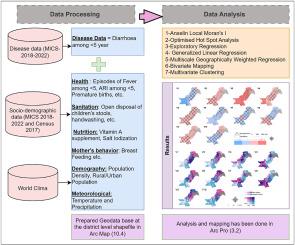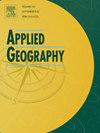Geospatial analysis of diarrhoea determinants among children under five in Pakistan using Multiscale Geographically Weighted Regression (MGWR)
IF 4
2区 地球科学
Q1 GEOGRAPHY
引用次数: 0
Abstract
Diarrhoea is the second most common cause of death among children under five worldwide. About 90 percent of diarrhoeal diseases occur in South Asia and sub-Saharan countries. In Pakistan, it causes almost 53,000 children to die every year. Against this background, this study aimed to analyze the geographical variations in the socio-economic and climatic determinants of under-five diarrhoea cases in districts of Pakistan. We used Generalized Linear Regression (GLR) and Multiscale Geographically Weighted Regression (MGWR) to explore the spatial variation of diarrhoea and its associated determinants. The MGWR model with 10 independent variables outperforms the GLR model (R2 = 0.72) with an adjusted R2 of 0.86. The local accuracy of the MGWR model increases from southwest to northeast. Furthermore among ten selected regressors, significant geographic diversity was found in the determinants of diarrhoea, including altitude, temperature, fever, ARI, and sanitation practices. These insights demand the need for targeted public health interventions, such as immunization campaigns, improved sanitation, and access to clean water and nutritional supplements, poverty eradication, especially in rural and high-risk regions. Future research should employ longitudinal designs and advanced spatial modeling to evaluate the impact of strategies and inform evidence-based policies to reduce the burden of childhood diarrhoea in Pakistan.

利用多尺度地理加权回归(MGWR)对巴基斯坦五岁以下儿童腹泻决定因素进行地理空间分析
腹泻是全球五岁以下儿童第二大常见死因。大约 90% 的腹泻疾病发生在南亚和撒哈拉以南国家。在巴基斯坦,腹泻每年造成近 53,000 名儿童死亡。在此背景下,本研究旨在分析巴基斯坦各地区五岁以下儿童腹泻病例的社会经济和气候决定因素的地域差异。我们使用广义线性回归(GLR)和多尺度地理加权回归(MGWR)来探讨腹泻及其相关决定因素的空间变化。带有 10 个独立变量的 MGWR 模型优于 GLR 模型(R2 = 0.72),调整后的 R2 为 0.86。从西南到东北,MGWR 模型的局部精确度不断提高。此外,在十个选定的回归因子中,发现腹泻的决定因素具有显著的地域多样性,包括海拔、温度、发烧、急性呼吸道感染和卫生习惯。这些启示表明,有必要采取有针对性的公共卫生干预措施,如免疫接种运动、改善卫生条件、提供清洁水和营养补充剂、消除贫困,尤其是在农村和高风险地区。未来的研究应采用纵向设计和先进的空间建模来评估各项战略的影响,并为循证政策提供信息,以减轻巴基斯坦儿童腹泻的负担。
本文章由计算机程序翻译,如有差异,请以英文原文为准。
求助全文
约1分钟内获得全文
求助全文
来源期刊

Applied Geography
GEOGRAPHY-
CiteScore
8.00
自引率
2.00%
发文量
134
期刊介绍:
Applied Geography is a journal devoted to the publication of research which utilizes geographic approaches (human, physical, nature-society and GIScience) to resolve human problems that have a spatial dimension. These problems may be related to the assessment, management and allocation of the world physical and/or human resources. The underlying rationale of the journal is that only through a clear understanding of the relevant societal, physical, and coupled natural-humans systems can we resolve such problems. Papers are invited on any theme involving the application of geographical theory and methodology in the resolution of human problems.
 求助内容:
求助内容: 应助结果提醒方式:
应助结果提醒方式:


